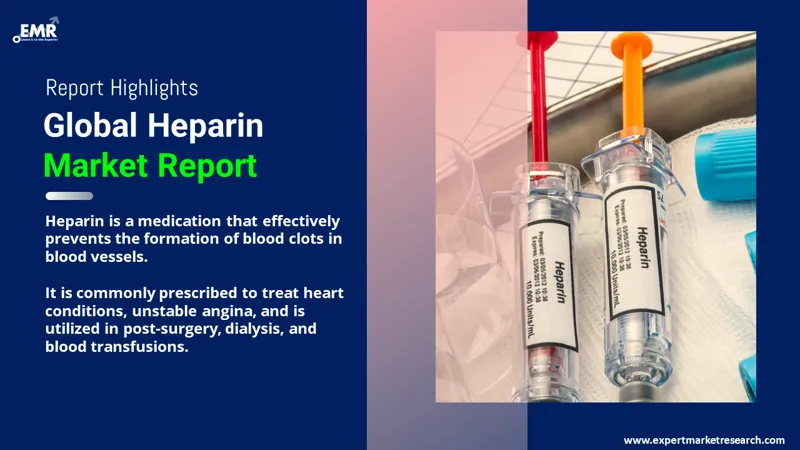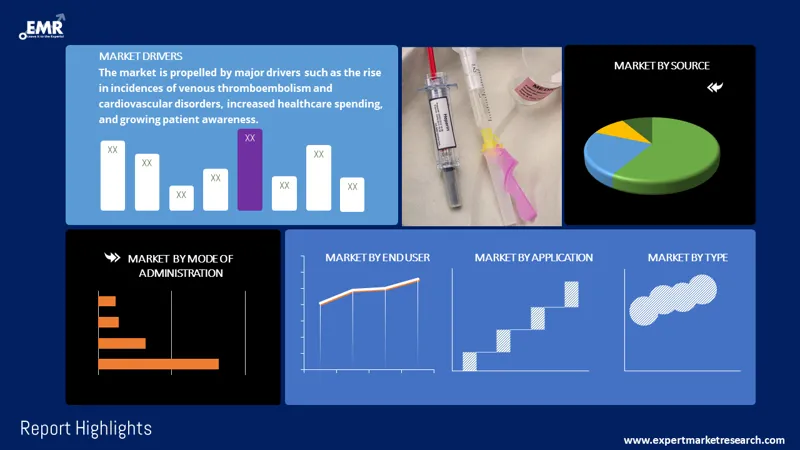
Consumer Insights
Uncover trends and behaviors shaping consumer choices today
Procurement Insights
Optimize your sourcing strategy with key market data
Industry Stats
Stay ahead with the latest trends and market analysis.
The heparin market was valued at USD 9.48 Billion in 2025, driven by the increasing use of anticoagulants and the growing prevalence of cardiovascular diseases across the globe. The market is anticipated to grow at a CAGR of 4.40% during the forecast period of 2026-2035, with the values likely to reach USD 14.58 Billion by 2035.
Base Year
Historical Period
Forecast Period
Compound Annual Growth Rate
4.4%
Value in USD Billion
2026-2035
*this image is indicative*
Heparin is an anticoagulant used to treat and prevent the formation of blood clots. Heparin cannot be absorbed via the digestive system, so it is taken intravenously or injected below the skin. Heparin drugs work by making thrombin (a coagulation factor) inactive, preventing clot formation in the blood. Heparin is used for certain medical conditions such as venous thromboembolism (VTE), deep vein thrombosis (DVT), heart attack, or after a medical procedure like heart surgery.
The heparin market growth is driven by the increasing prevalence of cardiovascular diseases, which is poised to fuel the demand for anticoagulant products. Venous thromboembolism (VTE), characterized by the formation of a blood clot in the veins, and affects 1 in 12 individuals in the western region, with 20% of affected individuals dying within an year of diagnosis. As a result, there is a high demand for anticoagulants and is expected to increase in the forecast period. In addition, growth in healthcare expenditure and rising patient awareness are some of the key factors poised to accelerate the market growth in coming years.

Read more about this report - REQUEST FREE SAMPLE COPY IN PDF
Increased Approval for Heparin Drugs by Regulatory Bodies
The surge in drug approvals by health authorities such as the United States Food and Drug Administration (FDA) along with the increased use of heparin in various drug formulations is projected to increase the heparin market share in the coming years. In November 2023 , the FDA approved DefenCath, a formulation of taurolidine and heparin, developed by a United States-based biopharmaceutical company CorMedix Inc. The therapeutic product DefenCath is an antimicrobial catheter lock solution that reduces catheter-related bloodstream infections (CRBSIs) by 71% in adult hemodialysis patients. The approval is based on the positive results from the phase 3 LOCK IT-100 trial.
Rise in Product Launches to Meet the Rising Heparin Market Demand
In June 2023 , Techdow USA Inc., a pharmaceutical company announced the launch of generic Enoxaparin Sodium (Preservative Free) Prefilled Syringes, a low molecular weight heparin (LMWH). Available at different strengths such as 30mg, 100mg, and 150mg, the drug prevents the formation of blood clots in various medical conditions. The U.S. FDA granted the final approval of the Abbreviated New Drug Application for the product as well. The commercial release and approval of such products indicate the commitment of the key market players to meet the rising demand for heparin.

Read more about this report - REQUEST FREE SAMPLE COPY IN PDF
The EMR’s report titled “Heparin Market Report and Forecast 2026-2035” offers a detailed analysis of the market based on the following segments:
Market Breakup by Products
Market Breakup by Source
Market Breakup by Applications
Market Breakup by Region
North America accounts for the largest share of the heparin market which can be attributed to the increasing prevalence of cardiovascular diseases in the region. According to the data released by the American Heart Association , cardiovascular diseases stand as the leading cause of death in the United States. Heparin, as an anticoagulant, plays a crucial role in treating and managing cardiovascular conditions and thus, has a significant demand in the region. In addition, the growth of the market is propelled by the presence of the key market players and robust support from the government.
Asia Pacific also holds a significant heparin market share and is anticipated to witness rapid growth in the coming years. The major key drivers are the rising patient awareness and disease burden. Furthermore, technological advancements and intensive research and development activities to improve the healthcare system are expected to accelerate the market growth. In May 2023 , a team of researchers at the Thailand Excellence Center for Tissue Engineering and Stem Cells, Department of Biochemistry from Chiang Mai University discovered an alternative source of heparin. They extracted acharan sulfate (heparin-like substances) from the mucus of the giant African snail, Achatina fulica, which has the potential to address the rising demand for the essential anticoagulant.
In November 2023, a multinational Danish pharmaceutical company, Leo Pharma, announced a cooperation agreement with a Greek pharmaceutical company, Vianex SA. Under the terms of agreement, Vianex will be responsible for manufacturing low molecular weight heparin and unfractionated heparin. On the other hand, Leo Pharma will handle the distribution of the final product. The production of five product codes is estimated to amount to several million vials per year. The objective of the collaboration is to increase their market presence and expand the distribution of their products in over 23 countries. This indicates a market trend of increasing collaborations among the leading market players to boost their manufacturing capacity. Consequently, this will fuel the heparin market share in the forecast period.
The key features of the market report include patent analysis, grants analysis, clinical trials analysis, funding and investment analysis, partnerships, and collaborations analysis by the leading key players. The major companies in the market are as follows:
Kindly note that this only represents a partial list of companies, and the complete list has been provided in the report.




*While we strive to always give you current and accurate information, the numbers depicted on the website are indicative and may differ from the actual numbers in the main report. At Expert Market Research, we aim to bring you the latest insights and trends in the market. Using our analyses and forecasts, stakeholders can understand the market dynamics, navigate challenges, and capitalize on opportunities to make data-driven strategic decisions.*
Get in touch with us for a customized solution tailored to your unique requirements and save upto 35%!
The market was valued at USD 9.48 Billion in 2025.
The market is anticipated to grow at a CAGR of 4.40% during the forecast period of 2026-2035, with the values likely to reach USD 14.58 Billion by 2035.
The increased expenditure on healthcare and the rising patient awareness are some of the factors contributing to the market demand.
The high demand for anticoagulants and the growing use of heparin in various drug formulations are the major trends driving the heparin market. In November 2023, the FDA approved DefenCath, a formulation of taurolidine and heparin, developed by CorMedix Inc. It is an antimicrobial catheter lock solution that reduces catheter-related bloodstream infections (CRBSIs) by 71% in adult hemodialysis patients.
The various products in the market are unfractionated heparin, low molecular weight heparin (LMWH), and ultra-low molecular weight heparin (ULMWH).
Based on the source, the market is segmented into bovine and porcine.
Application areas of heparin include deep vein thrombosis (DVT), atrial fibrillation & heart attack, and coronary artery disease, among others.
The major regions of the market include North America, Europe, Asia Pacific, Latin America, Middle East, and Africa.
Key players involved in the market are Aspen Pharmacare Holdings Limited, B Braun Melsungen AG, Baxter International, Dr. Reddy's Laboratories, Hebei Changshan Biochemical Pharmaceutical, Leo Pharma AS, Opocrin SpA, Pfizer Inc, Techdow USA, Viatris Inc., Novartis AG, Aspen Oss, Leo Pharma A/S, Hikma Pharmaceuticals PLC, and Sanofi.
Explore our key highlights of the report and gain a concise overview of key findings, trends, and actionable insights that will empower your strategic decisions.
| REPORT FEATURES | DETAILS |
| Base Year | 2025 |
| Historical Period | 2019-2025 |
| Forecast Period | 2026-2035 |
| Scope of the Report |
Historical and Forecast Trends, Industry Drivers and Constraints, Historical and Forecast Market Analysis by Segment:
|
| Breakup by Products |
|
| Breakup by Source |
|
| Breakup by Applications |
|
| Breakup by Region |
|
| Market Dynamics |
|
| Supplier Landscape |
|
| Companies Covered |
|
Datasheet
One User
USD 3,299
USD 2,969
tax inclusive*
Single User License
One User
USD 5,499
USD 4,949
tax inclusive*
Five User License
Five User
USD 6,999
USD 5,949
tax inclusive*
Corporate License
Unlimited Users
USD 8,199
USD 6,969
tax inclusive*
*Please note that the prices mentioned below are starting prices for each bundle type. Kindly contact our team for further details.*
Flash Bundle
Small Business Bundle
Growth Bundle
Enterprise Bundle
*Please note that the prices mentioned below are starting prices for each bundle type. Kindly contact our team for further details.*
Flash Bundle
Number of Reports: 3
20%
tax inclusive*
Small Business Bundle
Number of Reports: 5
25%
tax inclusive*
Growth Bundle
Number of Reports: 8
30%
tax inclusive*
Enterprise Bundle
Number of Reports: 10
35%
tax inclusive*
How To Order

Select License Type
Choose the right license for your needs and access rights.

Click on ‘Buy Now’
Add the report to your cart with one click and proceed to register.

Select Mode of Payment
Choose a payment option for a secure checkout. You will be redirected accordingly.
Strategic Solutions for Informed Decision-Making
Gain insights to stay ahead and seize opportunities.

Get insights & trends for a competitive edge.

Track prices with detailed trend reports.

Analyse trade data for supply chain insights.

Leverage cost reports for smart savings

Enhance supply chain with partnerships.

Connect For More Information
Our expert team of analysts will offer full support and resolve any queries regarding the report, before and after the purchase.
Our expert team of analysts will offer full support and resolve any queries regarding the report, before and after the purchase.
We employ meticulous research methods, blending advanced analytics and expert insights to deliver accurate, actionable industry intelligence, staying ahead of competitors.
Our skilled analysts offer unparalleled competitive advantage with detailed insights on current and emerging markets, ensuring your strategic edge.
We offer an in-depth yet simplified presentation of industry insights and analysis to meet your specific requirements effectively.
Share